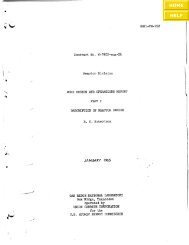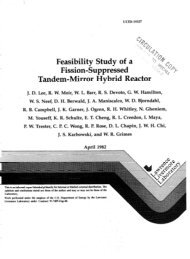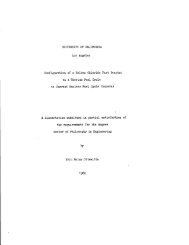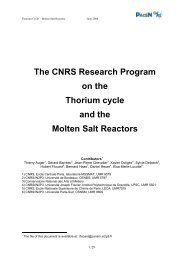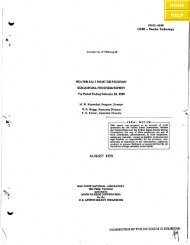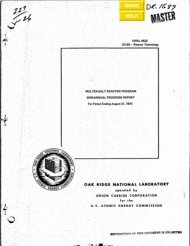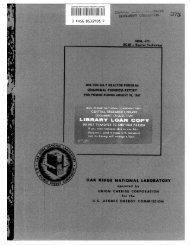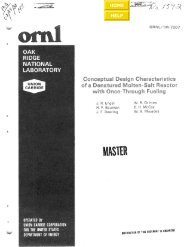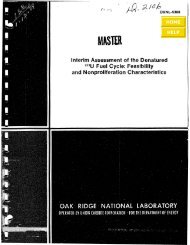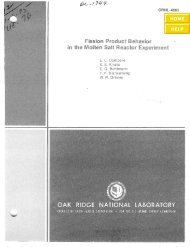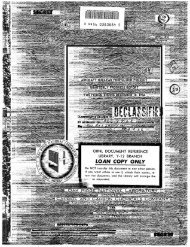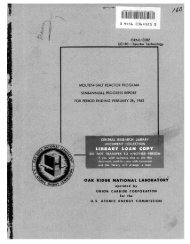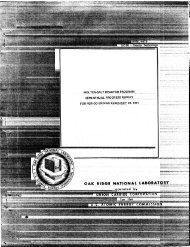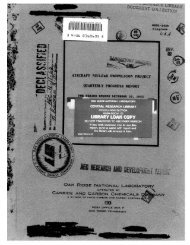ORNL-1771 - Oak Ridge National Laboratory
ORNL-1771 - Oak Ridge National Laboratory
ORNL-1771 - Oak Ridge National Laboratory
Create successful ePaper yourself
Turn your PDF publications into a flip-book with our unique Google optimized e-Paper software.
ANP QUARTERLY PROGRESS REPORi<br />
UNCLASSIFIED<br />
1041, , Y-12934<br />
Fig, F.13. Brcassd Air-Nozzle BBawk, Note<br />
bonding at the points of tangency of the stainless<br />
steel rods.<br />
using threaded molybdenum joints, whish were then<br />
protected from oxidation by the USC of welded cover<br />
plates. h t h loops failed early in corrosion tests<br />
hemuse of ftac:urc of the COYW plates and leakage<br />
frcm the joints.<br />
It is believed :hot overheating of the cover plates<br />
occurred while the loops were being initially heated<br />
by olectricul resistance. Since no metallurgical<br />
bond existed between the molybdenum and the<br />
cladding, separation became inore pronounced with<br />
increased tsnipernfUre, unti I fincpl ly a1 I the current<br />
was being ctxrried by iha rather thin COVE?' plates,<br />
Future molybdcnum Ptre;inol-convection loops will<br />
be made from arc-melted molybdenum, which is<br />
weldable, and the heavy nickel electrodes required<br />
foi resistance hcating will be welded directly to<br />
the molybdenum tuhc instead of to the cladding.<br />
Columbium clad with type 310 stainless steel has<br />
been fabricated into a theriiicrl-convection loop by<br />
-<br />
heliarc wc!dli?g in air. lhis lsop will be tested as<br />
soon as thc accessory parts are available.<br />
122<br />
Inconel-Type Alloys<br />
Eight tlierrnal-convection loops of Inconel-type<br />
I<br />
alloys were fabricated. I he compositions and room<br />
temperature properties of the alloys are given in<br />
Table 7.4. The alloys are being studied as a part<br />
of the effort to obtain alloys with better high-<br />
temperature corrosion resistance than that of Inconel.<br />
TABLE 7.4. PRDPERTIES OF HIGH-PURITY<br />
IN CON EL- T YP E Ab QQYS *<br />
-<br />
Nomina I lensile Yield<br />
Heat E longati on<br />
Composition Strength Point<br />
No, (%I<br />
(wt %) (psi) (psi)<br />
14 18 Cr, 7 Fe, 75 NI 85,000 41,500 49<br />
15 10 Cr, 15 Fe, 75 Ni 77,700 38,800 44<br />
16 5 Cr, 20 ke, 75 Ni 72,700 34,200 41<br />
17 io G, 7 Fe, 83 NI 76,000 36,000 44<br />
18 5 Cr, 10 ke, 75 Ni,<br />
10 Mn<br />
- __<br />
*hta obtained from the Superior Tube Company.<br />
Nick91-Molybdenurn-Bnse Alloys<br />
The nickel-molybdenum-base alloys are also being<br />
studied as port of the effort to obtain alloys with<br />
better high-temperature strength and corrosion re-<br />
sistance than are offered by Inconel. These re-<br />
quirements are met by Hastelloy B; however, some<br />
difficulties have been encountered in attempts to<br />
fabricate this material. In castings and in fusion<br />
welds, o whole range of composition results because<br />
of severe coring during freezing, and thus the<br />
properties of the fabricated specimen vary from one<br />
area to another. Even long-time high-temperature<br />
aging trentinents of such material will not produce<br />
on equilibrium structure. The aging treatment also<br />
results in a great increase in hardness with a<br />
corresponding decrease in ductility. At temperatures<br />
between 1200 and 1800"F, the wrought material<br />
exhibits its poorest ductility because of hot short-<br />
ness, which cun arise from trace impurities or the<br />
precipitation of an age-hardening constituent, which<br />
is probably the case for t-lastelloy 8. Thus the<br />
temperature range of poorest ductility of Hastelloy<br />
R coincides with the temperature range of con-<br />
templated use in high-temperature circu lating-fuel<br />
reactors. Hastelloy B is not recommended for use<br />
in air at temperatures above 1400°F becaose of



![Review of Molten Salt Reactor Physics Calculations [Disc 2]](https://img.yumpu.com/21979492/1/190x247/review-of-molten-salt-reactor-physics-calculations-disc-2.jpg?quality=85)
